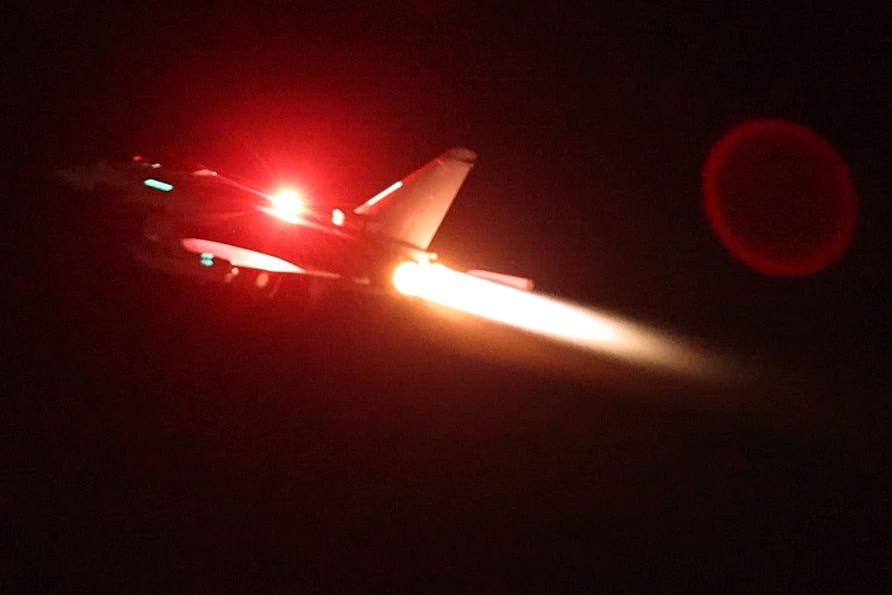RAF strikes not an escalation in Middle East conflict, Lord Cameron insists
The Foreign Secretary warned the world faces a perilous period, claiming the ‘lights are absolutely flashing red’ on the global dashboard.

Your support helps us to tell the story
From reproductive rights to climate change to Big Tech, The Independent is on the ground when the story is developing. Whether it's investigating the financials of Elon Musk's pro-Trump PAC or producing our latest documentary, 'The A Word', which shines a light on the American women fighting for reproductive rights, we know how important it is to parse out the facts from the messaging.
At such a critical moment in US history, we need reporters on the ground. Your donation allows us to keep sending journalists to speak to both sides of the story.
The Independent is trusted by Americans across the entire political spectrum. And unlike many other quality news outlets, we choose not to lock Americans out of our reporting and analysis with paywalls. We believe quality journalism should be available to everyone, paid for by those who can afford it.
Your support makes all the difference.Lord Cameron has denied RAF strikes in Yemen will escalate the picture in the Middle East, as he warned the world faces a period of great peril.
The Foreign Secretary insisted it was the Houthi rebels who had taken steps to escalate conflict in the region with their attacks on container ships passing through the Red Sea, as he hinted the UK could join further strikes in future.
The militant group, which backs Hamas, claims they have targeted ships with links to Israel.
The Houthis’ actions have posed a threat to the flow of global trade, disrupting merchant vessels from passing through the sea to the Suez Canal, a route which serves 15% of world shipping.
The Foreign Secretary denied that the UK had escalated the situation by taking part in US-led air strikes on Houthi military facilities across Yemen overnight on Thursday.
“The escalation has been caused by the Houthis. I mean the point is since November 19, you have had these 26 attacks”, Lord Cameron told the BBC’s Sunday with Laura Kuenssberg.
He added: “There have been more of them, they have been getting worse, and you know, not acting is also a policy, it is a policy that doesn’t work.”
Lord Cameron suggested the RAF could join the US in further strikes against the Houthis in order to deter their attacks.
“It’s right we’ve sent this very clear, very unambiguous message that we are prepared to follow our words and warnings with actions,” he said.
Lord Cameron said the Houthis’ attacks were among a number of international events which meant the “lights are absolutely flashing red” on the global dashboard, and meanwhile sought to portray the Prime Minister, Rishi Sunak, as a stable and safe leader who could grasp the crisis.
He told Sky: “Our view is look, take a step back from this, it is hard to think of a time when there has been so much danger and insecurity and instability in the world.
“The lights are absolutely flashing red as it were on the global dashboard.”
Lord Cameron added: “What we need at that time is strong leadership and a clear plan, that is what we have with the Prime Minister and the team in place.”
Labour leader Sir Keir Starmer agreed the world was in a period of “volatility”, but said his party could also provide stability and “strong leadership” if elected to government.
“If we were privileged enough to come in to serve, we would provide that leadership with an approach which is to co-operate and collaborate on a rules-based basis, for ensuring that we can play our part in de-escalating these conflicts,” he told broadcasters.
The Foreign Secretary also defended the Government’s decision not to make a statement to Parliament about the strikes on Houthi military targets beforehand.
The Lib Dems and SNP had criticised ministers for not taking steps to announce the operation in the Commons before it took place.
But Lord Cameron insisted Mr Sunak had “followed all the correct procedures” before the strikes, including assembling ministers, listening to advice, and consulting allies.
He added: “There will be a statement in Parliament on Monday.
“I don’t think it would have been right to have a debate and a vote before this sort of action, because I think it is important for reasons of operational security to on this occasion take the action and then have a statement in Parliament afterwards.”
Elsewhere, he said he did not agree with Turkey’s President Recep Tayyip Erdogan’s criticism that US-UK strikes were disproportionate.
Mr Erdogan had claimed the UK was turning the Red Sea into a “sea of blood”.
“He is an important Nato ally but in this case we don’t agree,” Lord Cameron said.
Some experts have warned that the attacks could fuel a wider conflict in the Middle East, but Mr Sunak has insisted the UK and USA acted in “self defence” in carrying out the strikes.
Defence Secretary Grant Shapps has meanwhile called on Iran to urge its Houthi allies, as well as Hezbollah, to “cease and desist” in their destabilising activities in the Middle East.